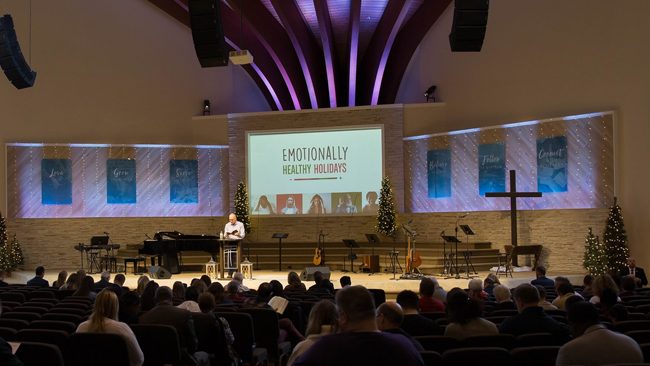A pastor-friend recently asked me this question, “What are the most essential changes made at Emmanuel over the last six years?” He urged me to shape my answer into a blog post, which I nervously submit to you at this time.
The question was difficult to answer for several reasons.
Jesus Really Leads the Change
First, it’s not so much that “I made changes” as much as God led change. This has not been an exercise of “making Emmanuel what I want it to be.” Quite honestly, how God has led has often been no part of “my plan.” He has surprised me! I’m simply not smart enough to have strategized what God has done at Emmanuel.
To say it another way, Emmanuel today is not what I expected Emmanuel to be, but it is undeniably what God desires Emmanuel to be. We are collectively learning to set aside personal agendas and preferences, and to let Him shape and transform His church. Many times Jesus has said to my heart, “Get out of my way. This is my church.” That’s a complex directive when all of my life I have been taught a neatly packaged idea of what a church should be.
The changes have been God’s doing—thankfully. Our mission has been to seek Him, obey Him, and magnify Him to New England and our world. Our mission has been to get back on His mission, to fight the battles on the biggest hills, to engage in the war worth dying for, and to avoid distracting pettiness. All along the way there have been encouragers and murmurers—like the crowd surrounding Jesus the day He reached out to Zacchaeus. We are not the church that “everyone else” wants us to be, but that’s not our goal. Jesus’ Lordship is our goal.
Stronger Doctrine = Good Change
Second, the changes have not been doctrinal, except in the case of more strongly emphasizing doctrine from a gospel-oriented perspective. To a great degree, getting back on gospel-mission is a doctrinal adjustment, but a thoroughly biblical one. Our focus has been gospel-centered, grace-driven, love-motivated ministry with a thorough commitment to biblical truth and sincere worship. Our vision has been laser focused on lost people and helping them understand the gospel. We have tried to teach the Emmanuel family that some things are worth dying for, and other things are not worth fighting over. We have sought a church family unified by what Paul called “fellowship in the gospel.” (Philippians 1:5)
Surprised and delighted by the change
What God has done is not only surprising, beautiful, and marvelous—it is so very enjoyable and delightful! Emmanuel has become a church, by God’s grace, where people want to bring their friends because they know they will hear the gospel and have the opportunity to grow in grace. They know they can bring them to hear truth in a loving, gracious context. They know Emmanuel is a safe place where unbelievers can be loved no matter how long it takes them to embrace the gospel. Sundays at Emmanuel are celebrations—moments of joyful worship, encouraging fellowship, warm hospitality, and thorough biblical teaching with gospel clarity.
After considering the question and asking some of our leaders, here is a list of what we feel are the most vital changes that have happened at Emmanuel over the last six years:
1. Make Jesus and the Gospel the Top Priority.
It begins in the leader’s heart
This is more than talk. The gospel has taken centerstage in my own heart as a Christian. During my cancer battle and in the years following, God has done a deep work of reorienting my Christian life back to the gospel in ways I could have never comprehended before cancer. That work has simply overflowed into His church.
God’s whole story is about the gospel
The gospel is a part of everything we do. We have framed everything around gospel theology and practice. Why? Because every page of the Bible points to the gospel. God’s message to man is the gospel (good news)—every story, narrative, figure, character, book, chapter, verse, symbol, or ceremony somehow points to Jesus and the hope we have in His death and resurrection. Every moment of the Christian life is to be lived in the gospel—immersing in it, returning to it, and letting its power continually compel our love, service, and sanctification to Jesus.
Without doubt, the single most significant change we’ve made is to make the gospel the driving force of our church life. In this we have chosen to build God’s people through biblical substance. If we attempt to develop God’s church with entertainment alone, we will never keep up with culture. But if we develop God’s church with infinite gospel truth, we will never run out of substance!
2. Lead the Church in Authentic Worship.
Worship is a personal, heart thing
This is a natural second, because a gospel-shaped heart instinctively desires to explode in worship. Worship is the heart expression of two things—humble reverence and explosive praise for God’s infinite love. Worship is not ceremony, but a heart context that flows through all of life. Every day should be lived in a posture of worship—focused love flowing toward my Saviour.
Hymns or new songs—either way, bring back the passion
This change was not about a musical style, except in the fact that it required us to break out of the box of mechanized, droning predictability and rote singing. This change is about developing a heart of worship in the church family and about leading in sincere, corporate, and celebrative times of focused adoration to Jesus. We do this with hymns and new songs, with multiple instruments, and with joy.
It’s not about trends or traditions—it’s about Jesus
Worship at Emmanuel is not about entertainment. We’re not trying to merely please men (or displease them)—neither critics nor constituents. The focus is on pleasing God and leading hearts to look up. Our desire is a kind of worship that renews love for Jesus and orientates hearts toward Him. We choose songs, not by association, but for theological and congregational value—substance and sing-ability. The goal is not entertainment but engagement.
Sincere worship is attractive (to believers and unbelievers)
What have we discovered? That sincere worship is engaging for both believers and unbelievers. Believers fall back in love with Jesus. Unbelievers marvel at an environment that they don’t fully understand, but that touches a part of their heart that has long been empty. Worship is as much a part of evangelism as anything else we do to give the gospel. Sincere worship is the joyful, explosive display of loving hearts set free. It is the gospel on display—and it doesn’t ostracize; it attracts at a spiritual level. Authentic worship displays the gospel just as preaching declares the gospel and makes it understandable and receivable.
3. Cultivate a Warm Culture for Unbelievers and Guests
We lost the insider culture
This one is very intricate and involves everything from serving coffee to teaching the church how to expect guests and unbelievers. This development was about losing the “insider feel,” the club-ish feel—the verbiage, the behaviors that make outsiders feel exceedingly “outside.”
This is a journey we are still on. A church naturally drifts toward insider culture; so it takes regular conversations, consistent attention, and intentional contact with the “outside world” to avoid the slippage. It means we strive to maintain friendships and relationships with people who are not “like us.”
We lost the museum culture
We started serving pastries and coffee as people arrive for church. Yes, they drink coffee during church. Yes, we want to be hospitable. Emmanuel is not a museum; it is a hospital for hurting people—a place of warmth, generosity, and joy. When Jesus met people, He fed them, ate with them, and loved them. Jesus was hospitable, and we believe His church should be too.
Develop a “Come and see” culture
Our church family has confidence that their guests will hear the clear gospel. Christians want their friends, neighbors, family, and coworkers to hear the gospel; but not everybody is confident enough to approach somebody with the gospel. We combat this in two ways—first, we equip our church family to share their faith; second, we give them an easy way to do it. We want a “Come and see” culture! Everybody knows someone to whom they can say, “Come and see!”
4. Provide Gospel-Shaped Team Leadership
The gospel constructs a leadership style
Leadership styles can be connected to personality, but some leadership styles are simply fleshly and need to be unlearned and replaced by the fruit of God’s Spirit. First Peter 5 makes it clear that fear-driven, domineering, passive-aggressive leadership styles are unbiblical. A corporate, power mentality is hurtful to God’s people and to the sustainability of ministry (both for the leader and the flock). The gospel, however, shapes a Jesus-like leadership style—characterized by security, humility, grace, truth, strength, and tenderness. Why does this matter?
A wounded church is often a skeptical church (for good reason)
Emmanuel, as a 100-year-old church, has seen every kind of leadership style over the years—for good and bad. The EBC family had little reason to trust me as a leader and many historical reasons to be cynical and skeptical. It was discouraging at first to enter a culture of distrust, but God showed me that distrust came from past wounds and fear. It wasn’t personal. He helped me see His wounded sheep as needing a biblical culture of leadership.
Gospel-shaped leadership is a lifetime journey
From the early days, God led us to articulate and define gospel-shaped leadership. I wish I had time to explain how personally complex this is. It required me to unlearn and relearn much about leadership—and it is a work that has barely begun in my heart and life. I have so much to learn about leading like Jesus! (Honestly, it’s a recurring source of personal discouragement.)
Learn to lead like Jesus
Every day I’m asking God to show me what it looks like to lead like Jesus and how the gospel transforms and informs leadership in counterintuitive ways. The gospel doesn’t allow us to merely emulate corporate leadership models, but neither does it allow us to be passive or disengaged. The gospel forbids us to lord over God’s people (to dominate them with personal authority), but it also calls us to lead His people to live under Jesus’ authority.
Gospel-shaped leadership flows from a gospel identity
The gospel shapes a kind of leadership that is free from personal agenda and identity creation, that is motivated by grace and love, and that drives continually at what is best for others. It is actually driven to care for others more than self.
Learn to lead with a team culture
Our pastors strongly desire to lead well, lead humbly, and lead as a team for the health of God’s people. We desire leadership that is clearly leading, but also clearly accountable and clearly not authoritarian. We desire to share the leadership and to train more leaders.
5. Choose to Follow Jesus, Regardless of the Cost
Jesus isn’t fearful of skeptics and scorners
As a church, we are not following a crowd, movement, or association. The church wholly belongs to Jesus, and we are daily seeking to stay out of His way. We are not trying to please outside spectators or examiners, but rather giving our hearts to gospel ministry in New England and around the world, focused on pleasing Jesus alone.
Joyful new believers beautifully overpower outside critics
Many rejoice. Some do not. Critics come and go, and their opinions are merely powerless opinions. The joy and new life in our church family and the internal assurance that we are honoring Him is enough to keep pressing forward. The anticipation of who will be saved this week drives us forward—eyes on Jesus, hearts toward gospel ministry.
There’s a relational cost (and benefit) to following Jesus
To preserve my joy and emotional health, I’ve had to release concern over the false narratives of outside observers and drive-by shooters. I’ve had to bury my heart in the hands of Jesus and press forward in the grip of His grace. Following Jesus has strangely and unexpectedly cost me some friendships. Yet, His Lordship trumps all other relationships.
By the way, Jesus has replaced lost friendships with healthy and durable ones. He has surrounded me with counselors, encouragers, co-laborers, collaborators, and companions who in no way are competitive or comparative. His grace is good in this way.
Build your identity on the freedom of obedience to Jesus
I’m seeking daily to grow in making my obedience to Jesus my deepest identity. This is the lifeblood, the sustaining energy of my heart and life. The drive-by shooters have helped me to grow in forgiveness and to build a gospel identity—releasing the need to be dependent upon approval or to be influenced by the disapproval of others. In an odd, grace kind of way, the cost is also accompanied by liberty, delight, and joy in Jesus.
I see it this way—if I will be criticized, I’m glad it is for the values I list above. These are worthy values over which to be hurt, and the outcomes are well worth the cost of criticism.
—————————————————
The most healthy changes are heart changes
The “changes” above are the most healthy, live-giving, and theologically sound changes. Jesus has led our church back to good doctrine, gospel ministry, and joyful health. He has led my heart to the same. More than a work in our church, it has been a wonderful work in our hearts.
Lead toward sustainable joy in Jesus
The personal health (spiritually, emotionally, relationally) that comes into a leader’s life in the context of biblical and balanced ministry is wonderful. God has a way of making our burden light and His joy full in our lives. His desire is for us to flourish. Following Jesus is a flourishing life. It is certainly easier to please Jesus than it is to please men, and He is a loving Lord that will lead you and your church toward sustainable joy.
As we approach our six-year mark at Emmanuel, we rejoice that Jesus is the Hero of the story! We celebrate a bunch of new friends who have become believers and followers of Jesus over six years. We believe a flourishing church is one of God’s greatest gifts, and we eagerly anticipate who will place their faith in Jesus this Sunday!
Thanks for sticking with me through this “too-long” post. God bless!




